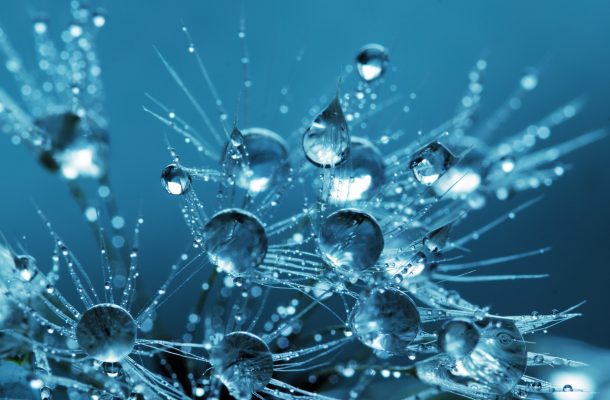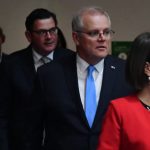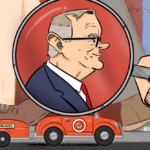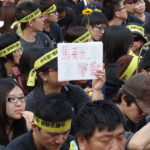The top ten science stories of 2018

While the ramifications of scientific advances can create knotty problems for society to solve, science not only generates concrete progress for humanity but reminds us of the power of a rational, evidence based approach in all areas of policy and personal endeavour. Here are ten of the biggest science stories of the year, as we look forward to 2019.
In March we bade a fond farewell to celebrated cosmologist Professor Stephen Hawking
 We said goodbye to one of the world’s best-known scientists in March, when British cosmologist Professor Stephen Hawking died at the age of 76. Hawking was perhaps best known for his 1988 book A Brief History of Time: From the Big Bang to Black Holes, a bestseller which sold 10 million copies in 20 years, and shot him to international stardom.
We said goodbye to one of the world’s best-known scientists in March, when British cosmologist Professor Stephen Hawking died at the age of 76. Hawking was perhaps best known for his 1988 book A Brief History of Time: From the Big Bang to Black Holes, a bestseller which sold 10 million copies in 20 years, and shot him to international stardom.
Hawking suffered from early-onset motor neurone disease, which leads to nervous system damage and physical wasting. But his story was one of triumph over adversity; in 1963, when Hawking was 21, doctors told him he had just two years to live. Hawking’s life was immortalised in the film The Theory of Everything, based on a book by his ex-wife Jane, in 2014.
Also in March, the first pedestrian was killed by a self-driving car
Ongoing work on self-driving cars suffered a serious setback in March, when the first case of an autonomous vehicle hitting and killing a pedestrian was reported. The victim, Elaine Herzberg, 49, was walking her bicycle outside a pedestrian crossing on a four-lane road in Tempe, Phoenix, when she was struck by an Uber vehicle travelling at about 65kmh. Herzberg later died in hospital.
The car had been in self-driving mode, but with an operator behind the wheel. Uber immediately suspended its self-driving car tests, although the firm has since resumed work on the program. In May, a US National Transportation Safety Board (NTSB) report on the crash found that the vehicle’s perception system had classified Herzberg as an unknown object until six seconds before the crash.
Just 1.3 seconds before impact, the vehicle realised it should brake, but the autonomous braking system had been disabled to prevent any conflict with the human operator. In this case, the operator had been looking at a display screen, and had failed to notice Herzberg.
Australian experts commented on the news
Australian experts paid tribute to Stephen Hawking
In April the outlook looed bleak for our bleached Great Barrier Reef
 In April, Australian and US scientists warned us that the Great Barrier Reef (GBR) may never fully recover from damage caused by the marine heatwave of 2016. The heat caused a catastrophic coral die-off, transforming the ecology of around a third of the reef, they said.
In April, Australian and US scientists warned us that the Great Barrier Reef (GBR) may never fully recover from damage caused by the marine heatwave of 2016. The heat caused a catastrophic coral die-off, transforming the ecology of around a third of the reef, they said.
Their research used maps of heat exposure and coral death along the GBR’s 2,300km length to show many corals died immediately from heat stress, while many more died slowly as they released their algae partners (zooxanthellae) in response to the heat.
Bleached corals and those exposed to the highest temperatures were more likely to die, and the northern third of the GBR was hit hardest. Worryingly, severe bleaching occurred again in 2017, and the GBR will probably continue to decline until climate change stabilises, the authors warned.
Australian experts commented on the research
Australian Academy of Science Video
In May Australia got its own space agency
 In May, Aussie space fans had a reason to be cheerful as the Federal Government earmarked $50m in seed funding to kick start the Australian Space Agency. Plans to establish the agency were announced in 2017, as the government looked to break into a rapidly growing industry believed to be worth $420 billion annually, and the agency itself was officially launched in July this year.
In May, Aussie space fans had a reason to be cheerful as the Federal Government earmarked $50m in seed funding to kick start the Australian Space Agency. Plans to establish the agency were announced in 2017, as the government looked to break into a rapidly growing industry believed to be worth $420 billion annually, and the agency itself was officially launched in July this year.
The agency will focus on improving GPS technology and supporting the Australian space industry, with the private sector expected to provide the lion’s share of the cash required to maintain it. Ministers hope it will create thousands of jobs, although which state will host the agency and benefit from those jobs has yet to be decided – a decision which is expected by the end of the year.
Former CSIRO boss Megan Clark, who led the government’s initial investigation into the creation of the agency, is the Chief Executive, and it has been temporarily headquartered in Canberra until a permanent base can be established.
Australian experts responded to the news
Australian Academy of Science Video
In August an Australian won the world’s most prestigious maths prize
 In August, Professor Akshay Venkatesh, an Australian mathematician, won the Fields Medal, sometimes described as the ‘Nobel Prize of mathematics’. Venkatesh hails from Perth, WA, and received the award for his work on the maths of whole numbers and of dynamic systems.
In August, Professor Akshay Venkatesh, an Australian mathematician, won the Fields Medal, sometimes described as the ‘Nobel Prize of mathematics’. Venkatesh hails from Perth, WA, and received the award for his work on the maths of whole numbers and of dynamic systems.
From an early age, Venkatesh has been an exceptionally gifted mathematician. He was a child prodigy, completing high school and enrolling as an undergraduate at UWA at age 13, and graduating with an honours degree in pure mathematics aged just 16. Now 36, Venkatesh currently teaches at Stanford University in California, USA.
Australian Academy of Science Video
In September Australia’s largest clinical trial showed an aspirin a day won’t keep the doctor away
In September, Aussie researchers published the results of the largest clinical trial ever conducted in Australia, which found that taking a daily dose of aspirin doesn’t lower the risk of death or disability in elderly people without a history of heart disease, but it does increase the risk of major bleeding problems.
Many older people without a history of heart disease have been advised that a daily dose of aspirin is a sensible preventative measure, but instead of benefits, the trial found people taking aspirin were actually more likely to die than those given a placebo, and the drug didn’t help prevent cardiovascular disease or improve people’s chances of living free of disability.
The study, known as the Aspirin in Reducing Events in the Elderly (ASPREE) trial followed more than 19,000 healthy people aged 70 and over for five years. The researchers said they’ll continue to monitor participants to look for any beneficial effects of taking aspirin in the longer term, and they say aspirin still has clear benefits for those with a history of cardiovascular disease.
The AusSMC gathered comments from the study’s lead author and independent experts
In October the IPCC warned that time is rapidly running out to limit global warming to 1.5°C
 A landmark report from the Intergovernmental Panel on Climate Change (IPCC) released in October warned that the world’s greenhouse gas emissions must drop to zero by 2050 if we are to limit global average temperature increases to 1.5°C above pre-industrial levels – the more ambitious target agreed as part of the Paris Climate Agreement.
A landmark report from the Intergovernmental Panel on Climate Change (IPCC) released in October warned that the world’s greenhouse gas emissions must drop to zero by 2050 if we are to limit global average temperature increases to 1.5°C above pre-industrial levels – the more ambitious target agreed as part of the Paris Climate Agreement.
The report, authored by more than 90 scientists and based on thousands of studies, called for drastic and immediate action to curb emissions, highlighting that we are currently on track to push temperatures up by 3-4°C by the end of this century.
Exceeding the 1.5°C threshold would likely kill off coral reefs, end summer Arctic sea ice, and expose hundreds of millions of us to deadly heat waves, food and water shortages, and extreme weather, warned the experts.
The AusSMC hosted a media briefing on the report and asked experts for their views
Australian Academy of Science Video
In November a Chinese scientist claimed to have created the world’s first genetically modified baby
 Shock waves rippled through the world of science in November as He Jiankui, a Chinese researcher, announced the creation of the world’s first gene-edited humans. He claimed that as a result of his experiments, twin girls called Lulu and Nana had been born earlier that month.
Shock waves rippled through the world of science in November as He Jiankui, a Chinese researcher, announced the creation of the world’s first gene-edited humans. He claimed that as a result of his experiments, twin girls called Lulu and Nana had been born earlier that month.
He said he had used a technique called CRISPR to edit genes in two embryos, which he hoped would make the babies immune to HIV. One of the twins, born after the edited embryos were implanted into their mother, had two copies of the edited gene, He claimed, and should therefore be immune to the virus.
The news sparked outrage among the scientific community, which railed against his “irresponsible”, “unethical” and “monstrous” work. And He’s claims could not be verified, as no other scientists have seen his work, or the twins themselves. In response to international concern, China has since halted his research and He is reported to be missing.
Australian experts responded to the announcement
Australian Academy of Science Video
Again in November, the old kilogram died, but long live the new kilogram!
 Time was officially up for the kilogram in November, when scientists around the world decided to ditch ‘Le Grand K’ – the solid cylinder of platinum and iridium housed in Paris and used since 1889 to define the measure.
Time was officially up for the kilogram in November, when scientists around the world decided to ditch ‘Le Grand K’ – the solid cylinder of platinum and iridium housed in Paris and used since 1889 to define the measure.
The kilogram was the last remaining unit of measurement defined by a physical object, and the International Bureau of Weights and Measures felt it was time to update its definition for the 21st Century. And Le Grand K had been losing weight – once exact copies were no longer the same weight.
The new kilo is based on a universal natural constant called the Planck constant, which had to be defined very precisely before the new approach could be adopted. The Planck constant is the amount of energy released in light when electrons in atoms jump around from one energy level to another, and, like other natural constants used to define weights and measures, it remains the same wherever you are in the world.
Australian Academy of Science Video
Later in November, NASA’s InSight landed on Mars for a peek inside the red planet
After a few years of aborted attempts, seven months hurtling through 483 million km of space, and a wild ride through the Martian atmosphere at speeds of 19,000 kmh, NASA’s InSight (Interior Exploration using Seismic Investigations, Geodesy and Heat Transport) lander successfully touched down on the red planet in November.
InSight’s mission is to study the deep interior of the planet, measuring seismic activity and heat flows, with the aim of building an accurate 3D model of Mars. It will also help scientists learn more about how rocky planets such as Mars and Earth evolved.
Upon arriving, the lander immediately sent back images of Mars, and, in December, relayed its first audio recording – the first time any human, and quite probably anything else too, has listened to the Martian wind.
Australian experts commented in the run-up to the touchdown
This list was compiled by the Australian Science Media Centre.
Open Forum is a policy discussion website produced by Global Access Partners – Australia’s Institute for Active Policy. We welcome contributions and invite you to submit a blog to the editor and follow us on Twitter, Facebook, Linkedin and Mastadon.











